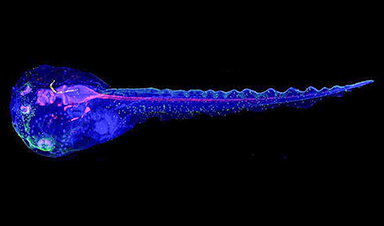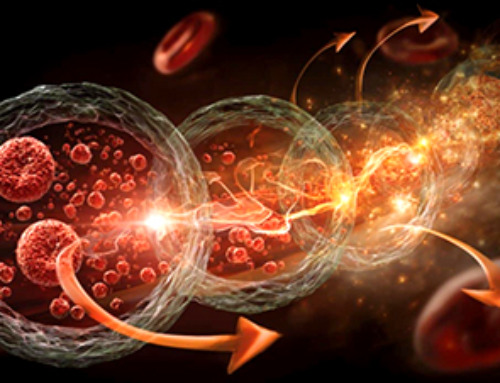What happens in the human brain when we learn from positive and negative experiences? To help answer that question and better understand decision-making and human behavior, scientists are studying dopamine.
Now, a new study from researchers at Wake Forest University School of Medicine published Dec. 1 in Science Advances shows that dopamine release in the human brain plays a crucial role in encoding both reward and punishment prediction errors. This means that dopamine is involved in the process of learning from both positive and negative experiences, allowing the brain to adjust and adapt its behavior based on the outcomes of these experiences.
“Previously, research has shown that dopamine plays an important role in how animals learn from ‘rewarding’ (and possibly ‘punishing’) experiences. But, little work has been done to directly assess what dopamine does on fast timescales in the human brain,” said Kenneth T. Kishida, Ph.D., associate professor of physiology and pharmacology and neurosurgery at Wake Forest University School of Medicine.
“This is the first study in humans to examine how dopamine encodes rewards and punishments and whether dopamine reflects an ‘optimal’ teaching signal that is used in today’s most advanced artificial intelligence research.”
For the study, researchers on Kishida’s team utilized fast-scan cyclic voltammetry, an electrochemical technique, paired with machine learning, to detect and measure dopamine levels in real-time (i.e., 10 measurements per second). However, this method is challenging and can only be performed during invasive procedures such as deep-brain stimulation (DBS) brain surgery. DBS is commonly employed to treat conditions such as Parkinson’s disease, essential tremor, obsessive-compulsive disorder and epilepsy.
Kishida’s team collaborated with Atrium Health Wake Forest Baptist neurosurgeons Stephen B. Tatter, M.D., and Adrian W. Laxton, M.D., who are also both faculty members in the Department of Neurosurgery at Wake Forest University School of Medicine, to insert a carbon fiber microelectrode deep into the brain of three participants at Atrium Health Wake Forest Baptist Medical Center who were scheduled to receive DBS to treat essential tremor.
While the participants were awake in the operating room, they played a simple computer game. As they played the game, dopamine measurements were taken in the striatum, a part of the brain that is important for cognition, decision-making, and coordinated movements.
During the game, participants’ choices were either rewarded or punished with real monetary gains or losses. The game was divided into three stages in which participants learned from positive or negative feedback to make choices that maximized rewards and minimized penalties. Dopamine levels were measured continuously, once every 100 milliseconds, throughout each of the three stages of the game.
“We found that dopamine not only plays a role in signaling both positive and negative experiences in the brain, but it seems to do so in a way that is optimal when trying to learn from those outcomes. What was also interesting, is that it seems like there may be independent pathways in the brain that separately engage the dopamine system for rewarding versus punishing experiences. Our results reveal a surprising result that these two pathways may encode rewarding and punishing experiences on slightly shifted timescales separated by only 200 to 400 milliseconds in time,” Kishida said.
Kishida believes that this level of understanding may lead to a better understanding of how the dopamine system is affected in humans with psychiatric and neurological disorders. Kishida said additional research is needed to understand how dopamine signaling is altered in psychiatric and neurological disorders.
“Traditionally, dopamine is often referred to as ‘the pleasure neurotransmitter,”‘ Kishida said. “However, our work provides evidence that this is not the way to think about dopamine. Instead, dopamine is a crucial part of a sophisticated system that teaches our brain and guides our behavior. That dopamine is also involved in teaching our brain about punishing experiences is an important discovery and may provide new directions in research to help us better understand the mechanisms underlying depression, addiction, and related psychiatric and neurological disorders.”
More information: Paul Sands et al, Sub-second fluctuations in extracellular dopamine encode reward and punishment prediction errors in humans, Science Advances (2023). DOI: 10.1126/sciadv.adi4927. www.science.org/doi/10.1126/sciadv.adi4927
News
AI matches doctors in mapping lung tumors for radiation therapy
In radiation therapy, precision can save lives. Oncologists must carefully map the size and location of a tumor before delivering high-dose radiation to destroy cancer cells while sparing healthy tissue. But this process, called [...]
Scientists Finally “See” Key Protein That Controls Inflammation
Researchers used advanced microscopy to uncover important protein structures. For the first time, two important protein structures in the human body are being visualized, thanks in part to cutting-edge technology at the University of [...]
AI tool detects 9 types of dementia from a single brain scan
Mayo Clinic researchers have developed a new artificial intelligence (AI) tool that helps clinicians identify brain activity patterns linked to nine types of dementia, including Alzheimer's disease, using a single, widely available scan—a transformative [...]
Is plastic packaging putting more than just food on your plate?
New research reveals that common food packaging and utensils can shed microscopic plastics into our food, prompting urgent calls for stricter testing and updated regulations to protect public health. Beyond microplastics: The analysis intentionally [...]
Aging Spreads Through the Bloodstream
Summary: New research reveals that aging isn’t just a local cellular process—it can spread throughout the body via the bloodstream. A redox-sensitive protein called ReHMGB1, secreted by senescent cells, was found to trigger aging features [...]
AI and nanomedicine find rare biomarkers for prostrate cancer and atherosclerosis
Imagine a stadium packed with 75,000 fans, all wearing green and white jerseys—except one person in a solid green shirt. Finding that person would be tough. That's how hard it is for scientists to [...]
Are Pesticides Breeding the Next Pandemic? Experts Warn of Fungal Superbugs
Fungicides used in agriculture have been linked to an increase in resistance to antifungal drugs in both humans and animals. Fungal infections are on the rise, and two UC Davis infectious disease experts, Dr. George Thompson [...]
Scientists Crack the 500-Million-Year-Old Code That Controls Your Immune System
A collaborative team from Penn Medicine and Penn Engineering has uncovered the mathematical principles behind a 500-million-year-old protein network that determines whether foreign materials are recognized as friend or foe. How does your body [...]
Team discovers how tiny parts of cells stay organized, new insights for blocking cancer growth
A team of international researchers led by scientists at City of Hope provides the most thorough account yet of an elusive target for cancer treatment. Published in Science Advances, the study suggests a complex signaling [...]
Nanomaterials in Ophthalmology: A Review
Eye diseases are becoming more common. In 2020, over 250 million people had mild vision problems, and 295 million experienced moderate to severe ocular conditions. In response, researchers are turning to nanotechnology and nanomaterials—tools that are transforming [...]
Natural Plant Extract Removes up to 90% of Microplastics From Water
Researchers found that natural polymers derived from okra and fenugreek are highly effective at removing microplastics from water. The same sticky substances that make okra slimy and give fenugreek its gel-like texture could help [...]
Instant coffee may damage your eyes, genetic study finds
A new genetic study shows that just one extra cup of instant coffee a day could significantly increase your risk of developing dry AMD, shedding fresh light on how our daily beverage choices may [...]
Nanoneedle patch offers painless alternative to traditional cancer biopsies
A patch containing tens of millions of microscopic nanoneedles could soon replace traditional biopsies, scientists have found. The patch offers a painless and less invasive alternative for millions of patients worldwide who undergo biopsies [...]
Small antibodies provide broad protection against SARS coronaviruses
Scientists have discovered a unique class of small antibodies that are strongly protective against a wide range of SARS coronaviruses, including SARS-CoV-1 and numerous early and recent SARS-CoV-2 variants. The unique antibodies target an [...]
Controlling This One Molecule Could Halt Alzheimer’s in Its Tracks
New research identifies the immune molecule STING as a driver of brain damage in Alzheimer’s. A new approach to Alzheimer’s disease has led to an exciting discovery that could help stop the devastating cognitive decline [...]
Cyborg tadpoles are helping us learn how brain development starts
How does our brain, which is capable of generating complex thoughts, actions and even self-reflection, grow out of essentially nothing? An experiment in tadpoles, in which an electronic implant was incorporated into a precursor [...]





















